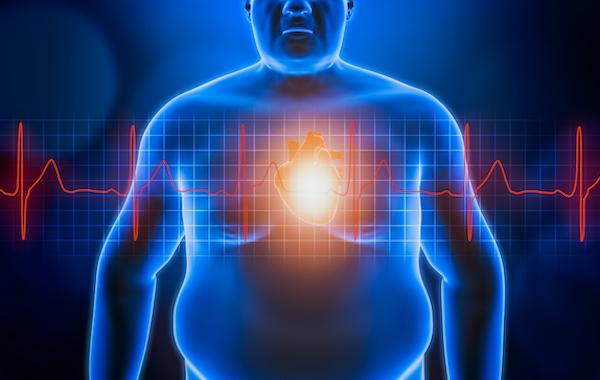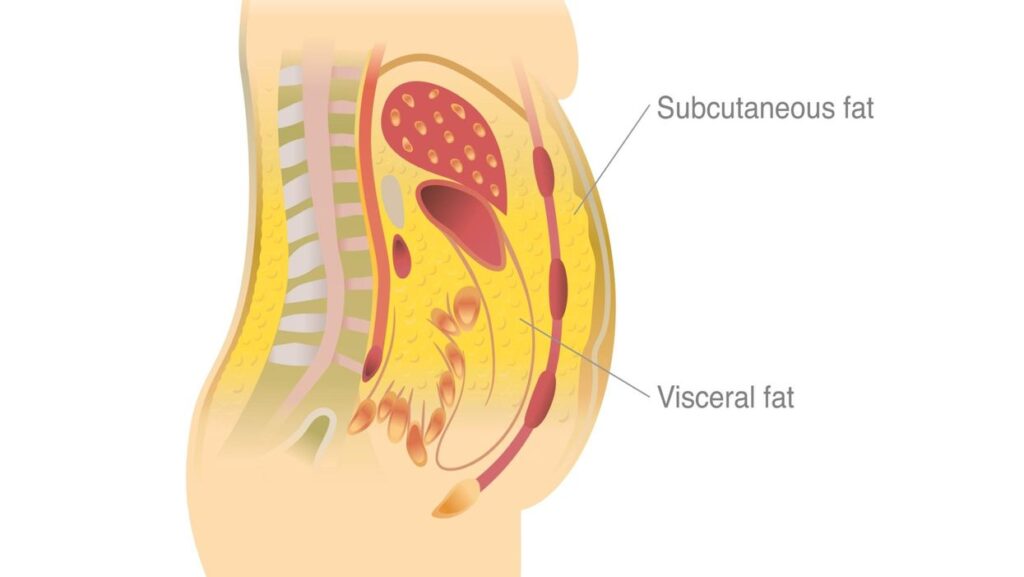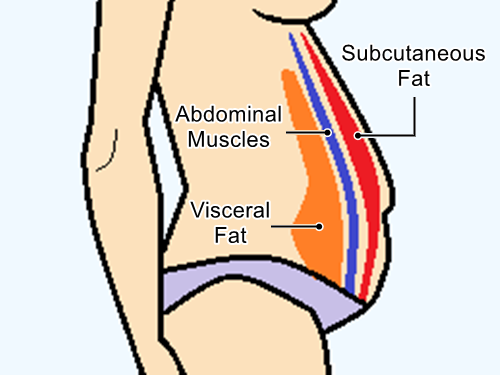Hey there! Have you ever wondered why abdominal fat is often deemed as the most hazardous type of fat in our bodies? Well, let’s talk about it! When it comes to fat, there are two main types that accumulate in the abdominal region: subcutaneous fat and visceral fat. Subcutaneous fat is the one we can visibly see, as it lies just beneath our skin’s surface. On the other hand, visceral fat is less noticeable, but it’s the real troublemaker as it wraps around our abdominal organs. This sneaky fat can increase the risk of health issues like heart disease, diabetes, and liver problems. Don’t worry, though! There are ways to tackle abdominal fat, such as exercising, strength training, managing stress, and making healthier dietary choices. So, let’s dive in and explore the hazards of abdominal fat and how we can say goodbye to it!
Types of Abdominal Fat
Abdominal fat is the most hazardous type of fat that accumulates in the abdominal region. It is not only an aesthetic concern but also a health concern. There are two types of abdominal fat: subcutaneous fat and visceral fat.
Subcutaneous fat is the fat that is visible and found just beneath the skin’s surface. It is the fat that we can pinch and feel. Although subcutaneous fat may not pose as significant of a health risk as visceral fat, it can still contribute to health problems if it is excessive.
Visceral fat, on the other hand, is less noticeable and accumulates around the abdominal organs. This type of fat is more dangerous and can increase the risk of health issues such as heart disease, diabetes, and liver issues. Unlike subcutaneous fat, visceral fat can interfere with the normal functioning of vital organs in our body, leading to serious health complications.

This image is property of s3-us-west-2.amazonaws.com.
Dangers of Abdominal Fat
Abdominal fat, particularly visceral fat, is associated with a range of health dangers. Here are a few of the most significant risks:
Increased Risk of Heart Disease
Excess abdominal fat, especially visceral fat, is strongly linked to an increased risk of heart disease. When visceral fat accumulates around the organs in the abdomen, it secretes various chemicals and hormones that can interfere with the normal functioning of the heart and blood vessels. This can lead to high blood pressure, high cholesterol levels, and other cardiovascular problems.
Higher Chance of Developing Diabetes
Abdominal fat, particularly visceral fat, is closely associated with an increased risk of developing type 2 diabetes. Visceral fat secretes inflammatory substances that impair the body’s ability to use insulin, which is crucial for regulating blood sugar levels. This leads to insulin resistance, a condition that can eventually progress to diabetes if not addressed.
Liver Issues and Disease
Visceral fat is known to contribute to liver issues and diseases such as fatty liver disease. When excessive amounts of visceral fat accumulate in the abdominal region, it can lead to an excessive accumulation of fat in the liver as well. This can cause inflammation and scarring of the liver, leading to liver dysfunction and potentially more severe conditions such as liver cirrhosis.

This image is property of consumer.healthday.com.
Methods to Lose Abdominal Fat
Now that we understand the dangers associated with abdominal fat, it’s important to explore effective methods to lose this excess fat. Here are some strategies that can help you reduce abdominal fat and improve your overall health:
Exercise and Strength Training
Regular exercise, including both cardiovascular exercise and strength training, is essential for losing abdominal fat. Aerobic exercises like jogging, cycling, and swimming help burn calories and fat overall, while strength training helps build muscle, increasing your metabolic rate and enabling you to burn more calories even at rest.
Limit Alcohol Consumption
Alcohol is known to contribute to the accumulation of abdominal fat. It is high in calories and can lead to an increase in appetite, making it easier to consume more calories than you burn. Limiting alcohol consumption, or preferably avoiding it altogether, can significantly help in losing abdominal fat.
Choose Healthy Carbs
When it comes to carbohydrates, it’s essential to choose healthier options. Instead of refined carbohydrates like white bread, pasta, and sugary snacks, opt for complex carbohydrates such as whole grains, fruits, and vegetables. These are rich in fiber, which helps in regulating blood sugar levels and keeps you feeling full for longer, preventing overeating.
Consume Protein Throughout the Day
Including sufficient amounts of protein in your diet can aid in abdominal fat loss. Protein helps in building and repairing tissues, and it also has a high thermic effect, meaning that your body burns more calories during its digestion and absorption. Including protein-rich foods such as lean meats, fish, eggs, legumes, and nuts in your meals throughout the day can support your weight loss goals.
Manage Stress
Stress can contribute to the accumulation of abdominal fat. When you are stressed, your body releases cortisol, a hormone that promotes the storage of fat, particularly in the abdominal area. Therefore, finding effective ways to manage stress, such as practicing relaxation techniques, engaging in hobbies, or seeking support from loved ones, can help in reducing abdominal fat.
Get Enough Sleep
Getting adequate sleep is crucial for overall health, including weight management. Lack of sleep can disrupt the hormonal balance in your body, leading to increased hunger, cravings for unhealthy foods, and a slower metabolism. Aim for seven to nine hours of quality sleep each night to support your abdominal fat loss journey.
Cut Back on Sugary Beverages
Sugary beverages, including soda, fruit juices, and sweetened coffee drinks, are loaded with calories and added sugars. These drinks contribute to weight gain and the accumulation of abdominal fat. Cutting back on sugary beverages and opting for water, unsweetened tea, or infused water can significantly reduce your calorie intake and support abdominal fat loss.
Consume More Fiber
Including an adequate amount of fiber in your diet is essential for losing abdominal fat. Fiber helps to regulate digestion, prevent constipation, and keep you feeling full. It also slows down the absorption of sugar, preventing blood sugar spikes. Increase your intake of fiber-rich foods such as whole grains, legumes, fruits, vegetables, and nuts to support your abdominal fat loss goals.
By implementing these methods into your lifestyle, you can significantly reduce abdominal fat, improve your health, and reduce the risk of associated health issues. Remember, every small step matters, so be consistent, stay motivated, and focus on adopting healthy habits that will benefit you in the long run.

This image is property of www.fit-and-well.com.
